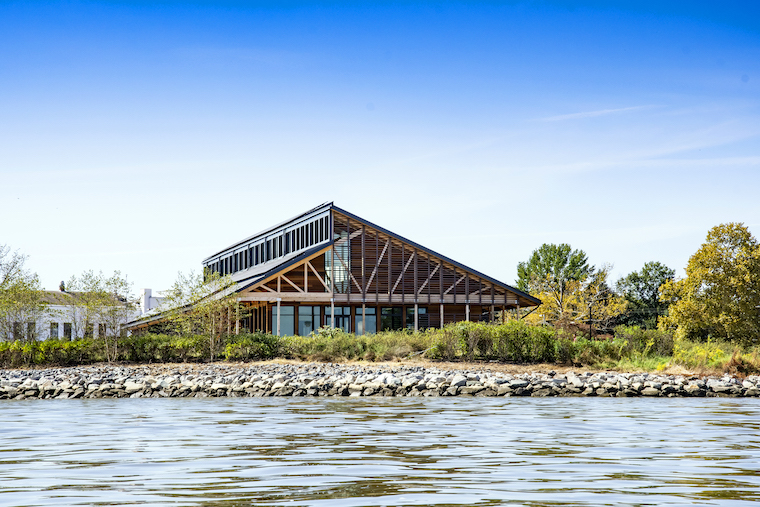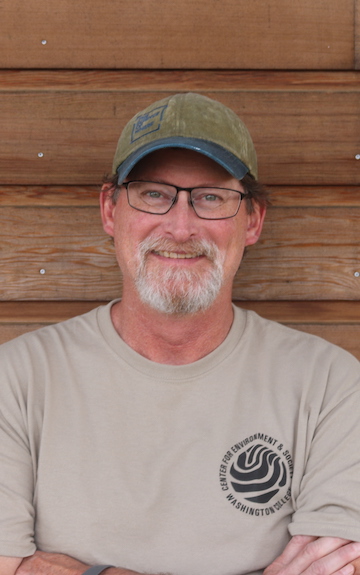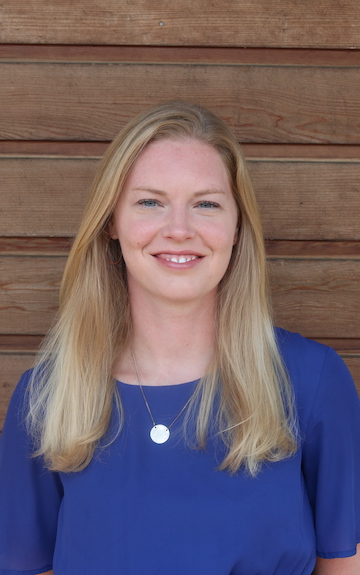Enhancing Our Understanding of Life on the Waterways
Two New Directors Join the Center for Environment and Society.

The Washington College Center for Environment and Society (CES) is pleased to announce the appointment of two new directors to its team: David Kramar and Chelsea Peters. Their expertise and passion for environmental research will significantly contribute to the Center's ongoing efforts to address pressing environmental challenges.
 David Kramar, Ph.D., was named the new Director of the River and Field Campus (RAFC) at CES in April.
With a keen interest in outdoor activities and a background in natural resources and
environmental research, Kramar is eager to expand RAFC's research capabilities and
engage students in meaningful projects.
David Kramar, Ph.D., was named the new Director of the River and Field Campus (RAFC) at CES in April.
With a keen interest in outdoor activities and a background in natural resources and
environmental research, Kramar is eager to expand RAFC's research capabilities and
engage students in meaningful projects.
"The diversity of research questions that RAFC offers is unique and broad,” Kramar said. “I'm excited to bridge my interests across multiple academic disciplines while supporting faculty and student research. Particularly, I'm interested in adding bald eagle research and banding, as well as grasslands research, to our offerings."
Kramar's previous work has focused on helping farmers improve their operations and enhance downstream water quality. His expertise will be invaluable in developing innovative strategies to address agricultural runoff and protect the region's waterways.
 Chelsea Peters, Ph.D., was appointed as the new Director of Watershed Innovation at CES in July. A
hydrologist with a passion for water resources and climate change, Peters' research
has focused on the salinization of coastal water resources in the Mid-Atlantic.
Chelsea Peters, Ph.D., was appointed as the new Director of Watershed Innovation at CES in July. A
hydrologist with a passion for water resources and climate change, Peters' research
has focused on the salinization of coastal water resources in the Mid-Atlantic.
"I'm excited to revitalize the Watershed Innovation Lab and invite students to help me explore water resources along the Eastern Shore," Peters said. "I look forward to collaborating with other regional non-profit and research institutions to investigate questions focused on water quantity and quality challenges, restoration practices, and complex environmental aquatic systems."
Peters plans to build a research hub that intensely monitors groundwater and surface water across the Chester River watershed. She is also excited to involve students in hands-on research projects, such as building weather stations, deploying buoys, and mapping shallow water habitats.
The addition of Kramar and Peters to the CES' diverse team of experts and researchers is a significant step forward in the Center's mission to advance environmental research and education.
“Everything we do is focused on preparing our students to address the most critical environmental challenges.” said Valerie Imbruce, Ph.D., Lammot Du Pont Director of Washington College's CES. “The addition of Dr. Peters and Dr. Kramar to our team marks a pivotal step forward. Their extensive experience and expertise will foster an environment where students can not only learn but also lead through real-world experiences and innovative solutions.”
Research and Innovation Around and On the Water
The College's River and Field Campus encompasses nearly 5,000 acres of diverse ecological communities just minutes from its main campus in Chestertown, including 2.5 miles of Chester River shoreline, a 90-acre freshwater lake, multiple streams and seasonal wetlands, 1,200 acres of forest, 3,000 acres of agricultural fields, and 228 acres of restored native prairie with natural grasses that have allowed northern bobwhite quail to flourish. The property also features 50 acres of managed, successional habitat for one of the most active bird-banding stations on the East Coast, handling approximately 14,000 birds a year.
The Watershed Innovation Lab (WIL) at Washington College creates unique devices to help understand, observe, teach and involve students in research that shows how watersheds work. From building water quality monitoring buoys to creating remote controlled boats to map water quality data, the WIL is a space for exploring the depths through creative technologies.
To learn more about the many opportunities CES affords students to solve the most pressing issues facing the future of our planet and its people through experiential learning, community and civic engagement, and research, head to their webpage.
- Dominique Ellis Falcon